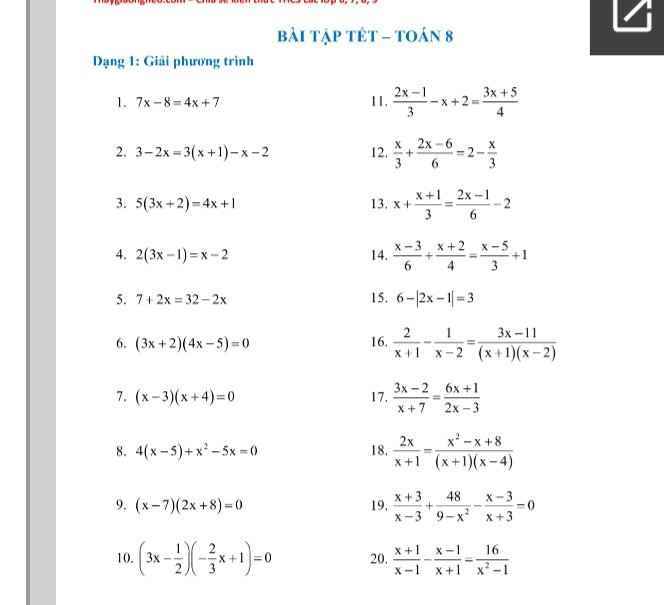
Hãy nhập câu hỏi của bạn vào đây, nếu là tài khoản VIP, bạn sẽ được ưu tiên trả lời.


Câu 9:
a. <=> 4x= 12
<=> x=3
S={3}
b. <=> (2x-6).(x+9)=0
<=> 2x-6=0 hoặc x+9=0
<=> x= 3 hoặc x=-9
S={3;-9}
c. <=> 5x=-20
<=> x= -4
S={-4}
d. <=> (2x-6).(3x+9)=0
<=> 2x-6=0 hoặc 3x+9=0
<=> 2x=6 hoặc 3x=-9
<=> x=3 hoặc x= -3
S={3;-3}
e. th1: 2x-3= 6x+5 nếu 2x-3>0 => x>\(\dfrac{3}{2}\)
2x-3=6x+5
<=>2x-6x= 5+3
<=>-4x=8
<=> x= -2 (loại)
th2: 2x-3= -6x+5 nếu 2x-3<0 => x<\(\dfrac{3}{2}\)
2x-3=-6x+5
<=>2x+6x= 5+3
<=>8x=8
<=>x=1 (chọn)
S={1}
f. <=> -12x>6
<=> x< -\(\dfrac{1}{2}\)
S={x/x<-\(\dfrac{1}{2}\)}
g. th1: 2x+3=4x+5 nếu 2x+3>0 => x>\(\dfrac{-3}{2}\)
2x+3=4x+5
2x-4x=5-3
-2x= 2
x= -1 (chọn)
th2: 2x+3=-4x+5 nếu 2x+3<0 => x<\(\dfrac{-3}{2}\)
2x+3=-4x+5
2x+4x= 5-3
6x=2
x= \(\dfrac{1}{3}\)(loại)
S={-1}
h. <=> -2x>-6
<=> x< 3
S={x/x<3}

40: Ta có: \(A=27x^3+8y^3-3x-2y\)
\(=\left(3x+2y\right)\left(9x^2-6xy+4y^2\right)-\left(3x+2y\right)\)
\(=\left(3x+2y\right)\left(9x^2-6xy+4y^2-1\right)\)



chu vi hình vuông là
50x4=200cm
độ dài 1 cạnh hình vuông là
50:4=12,5cm
diện tích hình vuông là
12,5x12,5=156,25cm2

ĐKXĐ: \(x\notin\left\{0;-9\right\}\)
Ta có: \(\dfrac{1}{x+9}-\dfrac{1}{x}=\dfrac{1}{5}+\dfrac{1}{4}\)
\(\Leftrightarrow\dfrac{20x}{20x\left(x+9\right)}-\dfrac{20\left(x+9\right)}{20x\left(x+9\right)}=\dfrac{4x\left(x+9\right)+5x\left(x+9\right)}{20x\left(x+9\right)}\)
Suy ra: \(4x^2+36x+5x^2+45x=20x-20x-180\)
\(\Leftrightarrow9x^2+81x+180=0\)
\(\Leftrightarrow x^2+9x+20=0\)
\(\Leftrightarrow x^2+4x+5x+20=0\)
\(\Leftrightarrow x\left(x+4\right)+5\left(x+4\right)=0\)
\(\Leftrightarrow\left(x+4\right)\left(x+5\right)=0\)
\(\Leftrightarrow\left[{}\begin{matrix}x+4=0\\x+5=0\end{matrix}\right.\Leftrightarrow\left[{}\begin{matrix}x=-4\left(nhận\right)\\x=-5\left(nhận\right)\end{matrix}\right.\)
Vậy: S={-4;-5}

\(1,7x-8=4x+7\)
\(\Leftrightarrow7x-8-4x=7\)
\(\Leftrightarrow7x-4x=7+8\)
\(\Leftrightarrow3x=15\)
\(\Rightarrow x=5\)
\(2,3-2x=3\left(x+1\right)-x-2\)
\(\Leftrightarrow3-2x=2x+1\)
\(\Leftrightarrow-2x+3=2x+1\)
\(\Leftrightarrow-2x-2x=1-3\)
\(\Leftrightarrow-4x=-2\)
\(\Rightarrow x=\dfrac{1}{2}\)
\(3,5\left(3x+2\right)=4x+1\)
\(\Leftrightarrow5.3x+5.2=4x+1\)
\(\Leftrightarrow15x+10=4x+1\)
\(\Leftrightarrow15x-4x=1-10\)
\(\Leftrightarrow11x=-9\)
\(\Rightarrow x=\dfrac{-9}{11}\)

Hướng làm:
Thấy cả tử mẫu cộng lại đều bằng 2021 → Cộng thêm 1 rồi quy đồng với mỗi phân thức
\(\dfrac{x+2}{2019}+1+\dfrac{x+3}{2018}+1=\dfrac{x+4}{2017}+1+\dfrac{x}{2021}+1\\ \Leftrightarrow\dfrac{x+2021}{2019}+\dfrac{x+2021}{2018}-\dfrac{x+2021}{2017}-\dfrac{x+2021}{2021}=0\\ \Leftrightarrow\left(x+2021\right)\left(\dfrac{1}{2019}+\dfrac{1}{2018}-\dfrac{1}{2017}-\dfrac{1}{2021}\right)=0\\ \Leftrightarrow x+2021=0\Leftrightarrow x=-2021\)
\(< =>\dfrac{x+2}{2019}+1+\dfrac{x+3}{2018}+1=\dfrac{x+4}{2017}+1+\dfrac{x}{2021}+1\)
\(< =>\dfrac{x+2+2019}{2019}+\dfrac{x+3+2018}{2018}=\dfrac{x+4+2017}{2017}+\dfrac{x+2021}{2021}\)
\(< =>\dfrac{x+2021}{2019}+\dfrac{x+2021}{2018}-\dfrac{x+2021}{2017}-\dfrac{x+2021}{2021}=0\)
\(< =>\left(x+2021\right)\left(\dfrac{1}{2019}+\dfrac{1}{2018}-\dfrac{1}{2017}-\dfrac{1}{2021}=\right)=0\)
\(< =>x+2021=0< =>x=-2021\)
Vậy....

\(a,x^2+8x+64=\left(x+8\right)^2\\ b,x^2-6x+9=\left(x-3\right)^2\\ c,x^2+10x+25=\left(x+5\right)^2\\ d,25x^2-30x+9=\left(5x-3\right)^2\\ e,x^2+7x+\dfrac{49}{4}=\left(x+\dfrac{7}{2}\right)^2\)
\(a,?đề\\ b,?đề\\ c,=\left(x+5\right)^2\\ d,=\left(5x-3\right)^2\\ e,=\left(x+\dfrac{7}{2}\right)^2\)
tik mik nha






